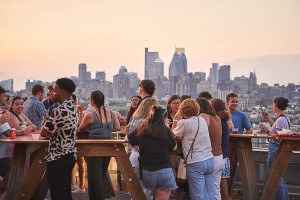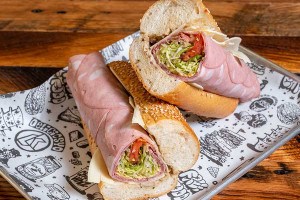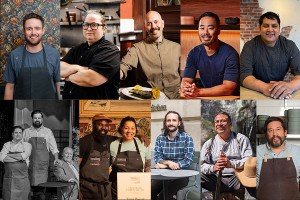Food for Thought: A Better Burger
 Grass-fed beef offers numerous benefits — both environmental and culinary — over the factory-farmed, corn-fed alternative. Mass-produced beef requires a host of fossil-fuel-derived fertilizers to produce all the corn needed for feed, while traditional grazing systems help replenish the land. Since it’s not natural for cows to eat corn, cattle raised this way are chronically sick, requiring large doses of antibiotics; grass-fed cows, on the other hand, are healthier, and the resulting beef is higher in omega-3 fatty acids. It also has a true beefy flavor that many connoisseurs prefer. But grass-fed beef can be a challenge to find, and not all grass-fed patties are created equal. Here’s our guide to local options for feel-good, taste-great burgers.
Grass-fed beef offers numerous benefits — both environmental and culinary — over the factory-farmed, corn-fed alternative. Mass-produced beef requires a host of fossil-fuel-derived fertilizers to produce all the corn needed for feed, while traditional grazing systems help replenish the land. Since it’s not natural for cows to eat corn, cattle raised this way are chronically sick, requiring large doses of antibiotics; grass-fed cows, on the other hand, are healthier, and the resulting beef is higher in omega-3 fatty acids. It also has a true beefy flavor that many connoisseurs prefer. But grass-fed beef can be a challenge to find, and not all grass-fed patties are created equal. Here’s our guide to local options for feel-good, taste-great burgers.
Bistro 7
At this Old City restaurant’s new burger night on Sundays, you can sink your teeth into guilt-free beefy goodness with a side of delectable duck fat fries. 7 North 3rd Street; 215-931-1560.
- How much grass? The beef comes from Green Meadow Farm, and the cows eat a 100 percent grass-fed diet with no antibiotics or hormones, naturally.
How much green? $13.
How local? This beef hails from Gap, Pa., making it the local-est on our list.
Noble
Noble’s bar menu is dressed down compared to its dining room fare, but this grass-fed burger is as carefully cooked as any other dish in the restaurant. 2025 Sansom Street; 215-568-7000.
- How much grass? Indian Ridge farm provides the protein for these burgers. This boutique purveyor’s pastured cattle eat only grass their whole lives long.
How much green? $12, including “special sauce,” fries, and cheddar cheese.
How local? The beef comes from Colorado — hardly something you’d run across at one of our area farmers’ markets.
Elevation Burger
This small burger chain with big ambitions has staked its brand on the feel-good ethos of grass-fed, organic beef — it’s the only kind they serve. 50 East Wynnewood Road, Wynnewood; 610-645-7704.
- How much grass? Elevation partner Michael Berger was surprisingly tight-lipped about the provenance of the beef used to make the company’s burgers: “We’re working on an exclusivity agreement with a single supplier, which is why we’re not saying.” Berger says that the cows eat only grass are slaughtered humanely, meeting halal specifications.
How much green? $5.99 for the two-patty Elevation Burger with “real cheddar” ($3.99 for a single-patty cheeseburger).
How local? The least local on the list: Bergur says the cows come from overseas. “But it’s not a country you would be worried about. You’ll see when we can make it public.”
The White Dog Café
The city’s old standby for local foods serves the most questionable “grass fed” burger on our list. Perhaps it’s time for the White Dog to up its ethical food game. 3420 Sansom Street; 215-386-9224.
- How much grass? Not as much as we expected. The beef comes from Painted Hills ranch, where cows graze until they are 14 months old and then they are shipped to a feedlot, where they eat a feed based on corn for the remaining three to six months of their lives.
How much green? $14, including fries and pickled vegetables.
How local? Not local. Beef from Oregon racks up the food miles.


